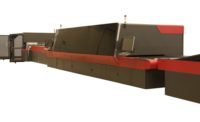Exporting: A Potential Opportunity For Snack Producers
Although many small and mid-sized snack food manufacturers choose to focus their attention on markets in their region, additional growth potential might exist for those manufacturers that look beyond America’s borders.
A new study by Promar International shows that although many U.S. savory snack companies have little or no interest in exporting, and most current exporting is achieved by their larger competitors, some small and mid-sized companies are achieving significant results. Similar potential might exist for others should they decide to explore these opportunities.
The study was conducted for Food Export USA — Northeast and the Mid-America Agri-Trade Council to assess export market interest in the Northeast and Midwest savory snack industries. The aim was to assess the industry’s level of export readiness, as well as to determine what constraints savory snack companies face and what factors lead to the decisions they make regarding marketing and exporting. SFA cooperated with the initiative.
Promar said it experienced difficulty in getting responses to both an Internet-based survey and requests for telephone interviews. It suggested this indicated a lack of interest on the part of many companies in the subject of exporting. The research group successfully completed 25 company interviews; 17 of these companies indicated they currently are not exporting. Nine of those firms expressed “some interest” in exporting.
The group said it interviewed eight companies and received five Web survey responses from companies involved in exporting. Most of these companies have many years of experience in the industry. Eight of the current exporters were companies with fewer than 100 employees and sales of less than $25 million. Only one company that replied to the Web survey had more than 1,000 employees or sales of more than $100 million, and the rest were firms with between 100 and 500 employees or less than $100 million in sales.
“For the most part, those companies with no interest in exporting simply feel that there is too much to be done in the domestic market,” Promar’s study report said. “Many of them are fighting for market share or trying to sustain growth in their home markets. This was also true for many of the companies with a potential interest in exporting, but the difference for these companies was that they were at least open to hearing about exporting and assessing if it would be a viable option for their business. Those companies eager to explore exporting are ready to grow their business and view exporting as another way they can increase sales.”
The report added that many small and medium-sized savory snack companies have limited resources to assess the market environment and plan for the future. Many of these firms, Promar said, are unlikely to consider exports and do not have the resources to develop export markets. However, many of these firms have little understanding of what is involved in exporting or how they might be able to accommodate it into their business activities, the report pointed out.
“There are examples of small and medium-sized savory snack food companies establishing successful export business,” Promar noted.
Between 1997 and 2004, savory snack exports fluctuated between about $440 million and $490 million and have shown little growth. They account for about 2% of domestic savory snack sales, with Canada, Mexico and Japan accounting for most of that business.
Based on its analysis, Promar made these observations:
It is difficult to develop awareness of exporting opportunities when companies have other front-of-mind domestic market issues to confront.
Many companies rarely take the opportunity to review novel export market opportunities through a formal planning exercise. Much attention falls on gaining sales within a known customer base within the local area.
Many assume that exporting is a second-best option to working in the domestic market. Their views are reinforced by concerns over many issues, but especially the nature of the product (particularly problems with shelf-life; high volume-to-weight ratio, and hence, transport costs; and potential product damage).
Few leading executives with marketing responsibility allocate time for consideration of exports as an alternative market.
It is unlikely that many snack producers will take the initiative to seek out an export promotion event.
Although many suggest that snack food products are not well adapted for exports, some companies are successfully exporting, and others are interested.
It is likely that there are savory snack companies that have a latent interest in exploring export opportunities among those Promar was unable to contact.
Cut Transportation Costs
Snack food manufacturers that operate fleets have an opportunity to cut transportation and logistics costs by participating in the FoodFleetXchange program, sponsored by SFA.
The online service, operated by AmeriQuest Transportation and Logistics Co., Cherry Hill, N.J., can help SFA members achieve significant savings on route sales products and supplies ranging from trucks to tires and fuel, as well as improve their efficiency.
The service also includes an information-sharing feature that allows fleet professionals to compare notes and seek solutions to common problems. A valuable and secure online tracking and reporting service is included, as well.
SFA members are eligible for this no-cost benefit, which includes special national pricing and rebates, simply by signing up. For more information, call SFA Vice President Chris Clark at 703-836-4500, ext. 218, or visit www.sfa.org and click on the FoodFleetXchange icon on the home page.
Reaching out to Mexico
Chris Clark, SFA vice president, operations and membership, represented the Snack Food Association at a Canacintra conference November 2-4 in Mexico City.
Joined by SFA’s Latin America consultant Ileana Lima, Clark met with Canacintra leaders and discussed ways in which the two organizations can cooperate in the coming year. SFA and Canacintra have agreed to share information and work together as much as possible to benefit members of both organizations.
During the Mexico City meeting, Clark and Lima greeted visitors in an SFA booth, where they promoted both SFA membership and the upcoming SNAXPO convention in March. For more information contact Chris Clark at 703-836-4500 ext. 218.



